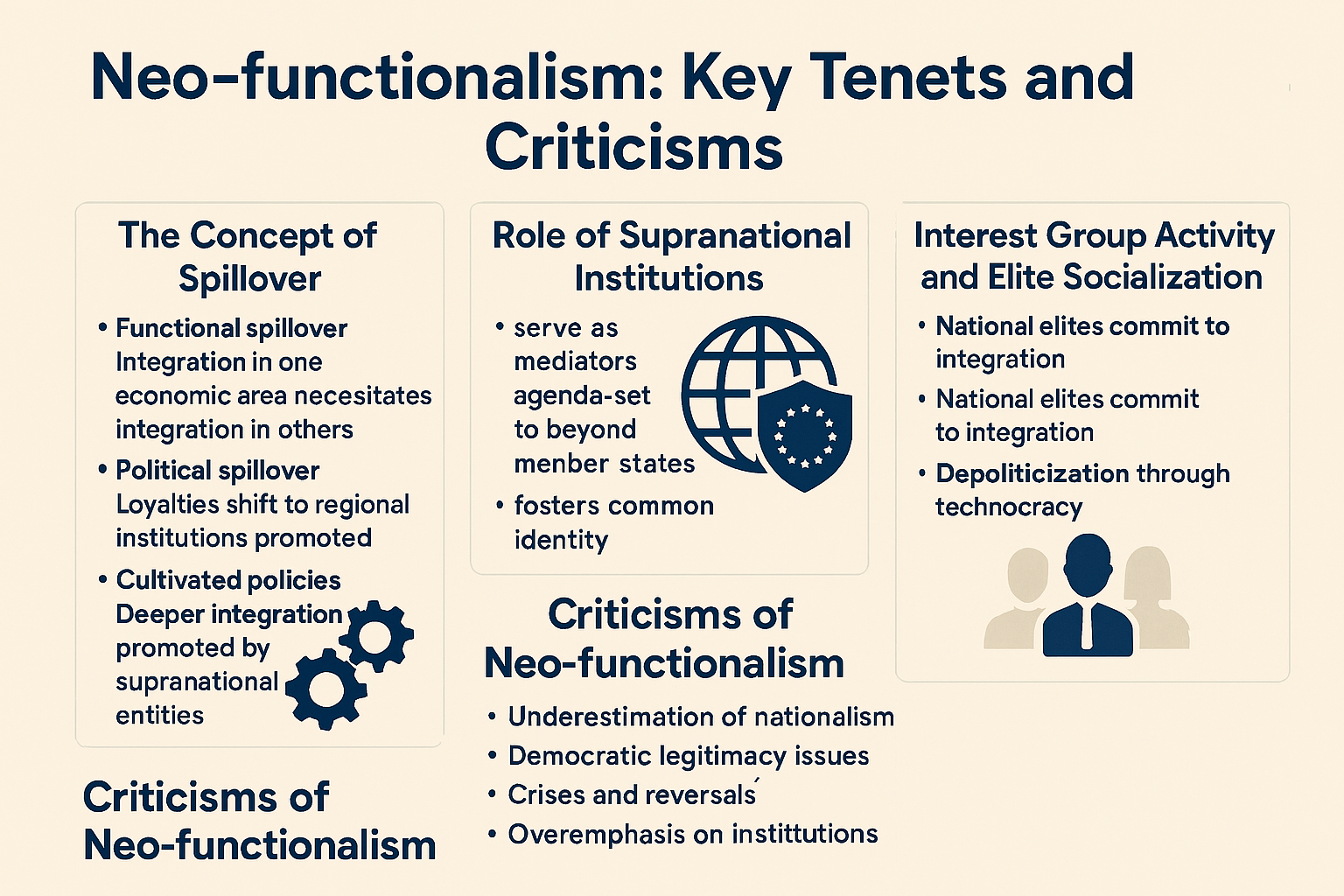Neo-functionalism is one of the foundational theoretical frameworks used to understand the process of regional integration, particularly in the context of post-World War II Europe. Developed in the mid-20th century, it offers insights into how and why sovereign states might choose to integrate in certain areas, ultimately leading to deeper political unity. It stands in contrast to classical intergovernmentalism by emphasizing the role of supranational institutions, non-state actors, and spillover dynamics in the integration process.
The principal architect of neo-functionalism is Ernst B. Haas, particularly through his seminal work “The Uniting of Europe” (1958). Later, scholars such as Leon Lindberg and Philippe Schmitter expanded and refined the theory.
Main Tenets of Neo-functionalism
1. The Concept of Spillover
At the heart of neo-functionalism lies the idea of spillover, which explains how integration in one sector creates pressure for further integration in related sectors. There are three main types of spillovers:
- Functional Spillover: Integration in one economic area (e.g., coal and steel) necessitates integration in others (e.g., transportation or energy) to achieve full efficiency.
- Political Spillover: As integration deepens, national political elites begin to shift their loyalties toward regional institutions, recognizing their growing relevance and authority.
- Cultivated Spillover: Supranational institutions like the European Commission actively promote deeper integration by leveraging their policy-making and agenda-setting powers.
These spillover effects help explain the gradual, albeit uneven, progress of European integration beyond economic cooperation into political and social domains.
2. Role of Supranational Institutions
Neo-functionalism assigns a central role to supranational bodies such as the European Commission, the European Parliament, and the European Court of Justice. According to the theory, these institutions are not passive administrators but active promoters of integration.
- They serve as mediators, arbiters, and even agenda-setters.
- Their autonomy allows them to formulate policies that go beyond the immediate interests of member states.
- They foster a sense of European identity and common interest, gradually reducing national-centric perspectives.
This emphasis distinguishes neo-functionalism from realist and intergovernmentalist approaches, which view states as the sole actors in international politics.
3. Interest Group Activity and Elite Socialization
Another key tenet is the role of interest groups and technocrats in shaping integration. As economic and social actors (e.g., business associations, labor unions, NGOs) find value in dealing with regional institutions, they develop a vested interest in the success of integration.
- Elite socialization occurs when national bureaucrats, policymakers, and experts interact within supranational forums, leading to a shared understanding and commitment to integration.
- These transnational networks contribute to the depoliticization of integration, making it a technocratic rather than a purely political issue.
4. Incremental and Irreversible Nature of Integration
Neo-functionalism views integration as a cumulative and quasi-irreversible process. Once states begin cooperating in one area, they become increasingly interdependent, making it more difficult to reverse integration.
- This view suggests that crises and challenges often lead not to disintegration but to a reconfiguration or deepening of integration.
- For instance, the economic crises of the 2000s, including the Eurozone debt crisis, led to the establishment of mechanisms such as the European Stability Mechanism (ESM)—a move toward tighter fiscal coordination.
Criticisms of Neo-functionalism
Despite its strengths, neo-functionalism has faced several criticisms, especially in light of political setbacks and public opposition to integration:
- Underestimation of Nationalism: Neo-functionalists assumed a linear, progressive path toward political union, underplaying the resilience of national identities and sovereignty.
- Lack of Democratic Legitimacy: The theory focuses heavily on elite-driven and technocratic processes, which often exclude the public. Events like the Brexit referendum and the rise of Euroscepticism reflect this democratic deficit.
- Crises and Reversals: The theory struggles to explain disintegration or stagnation—as seen in the rejection of the European Constitution in 2005 or Hungary and Poland’s resistance to EU norms.
- Overemphasis on Institutions: Critics argue that it gives too much agency to supranational institutions, overlooking the fact that member states still hold ultimate authority, especially in foreign and security policy.
Conclusion
Neo-functionalism remains a foundational theory in European integration studies. It successfully explains the early momentum behind the European Coal and Steel Community (ECSC) and the formation of the European Economic Community (EEC), offering a compelling model of gradual, sectoral integration driven by spillover dynamics and supranational actors.
However, its predictive power has been questioned in the face of growing nationalism, institutional pushback, and democratic discontent. While it provides a useful lens for understanding the mechanics and logic of integration, a more comprehensive understanding of the European Union today requires engagement with intergovernmentalist and constructivist perspectives as well.








Leave a Reply